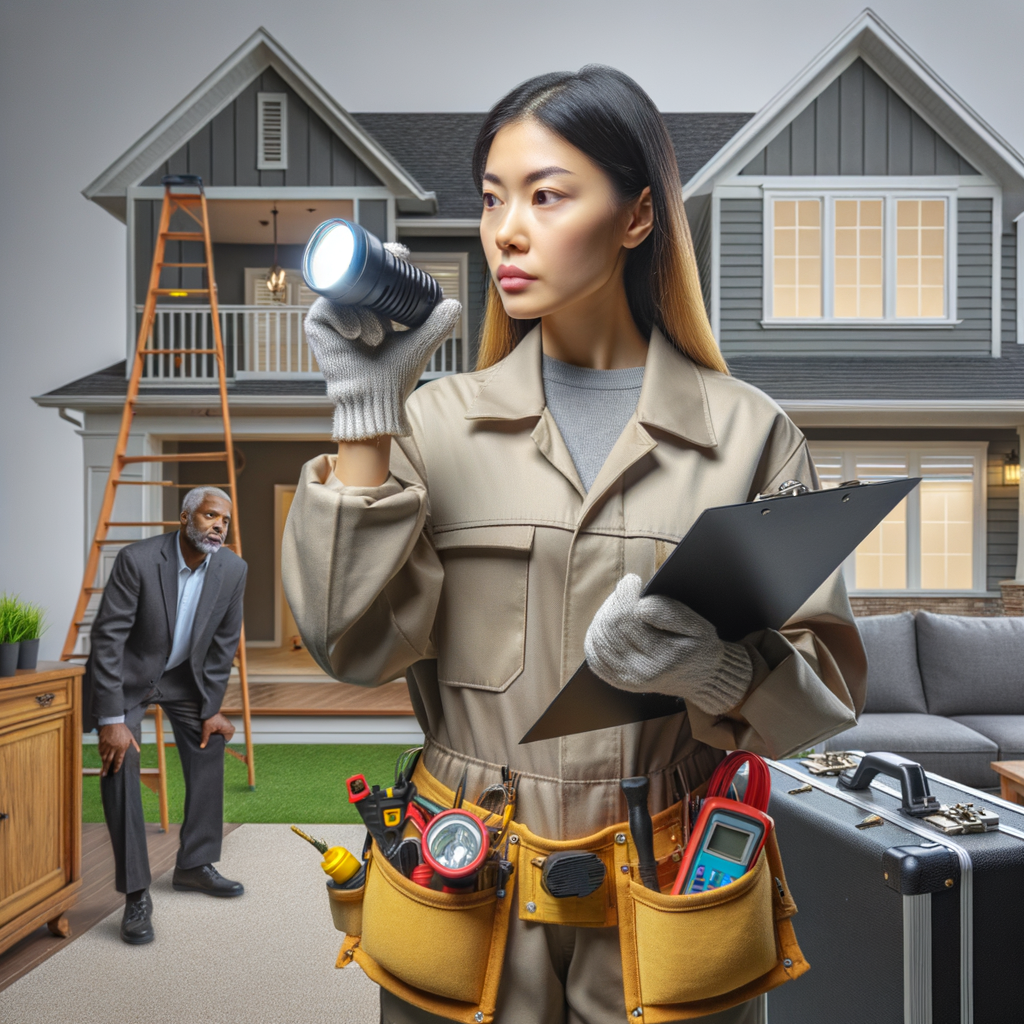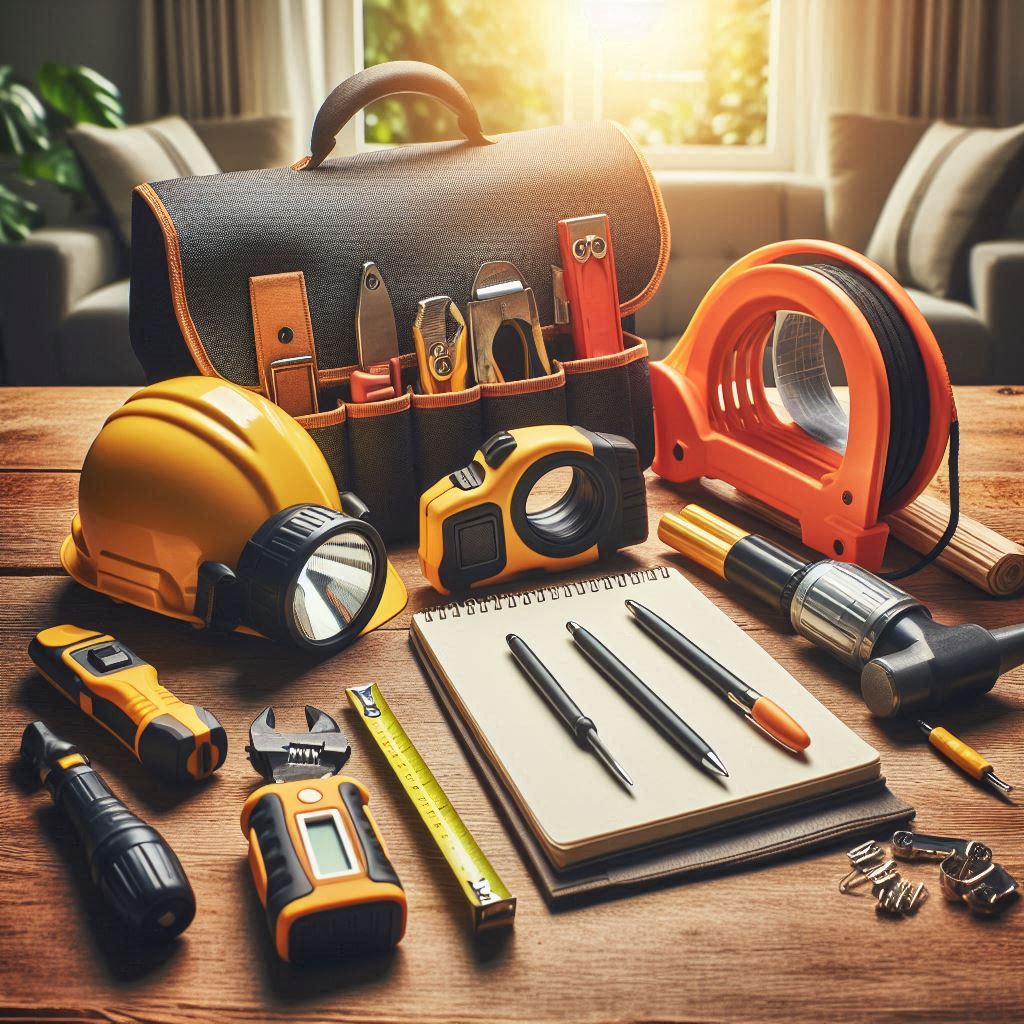A home inspection job involves assessing the condition and safety of residential properties. Home inspectors examine various aspects of a house, such as the structure, foundation, electrical systems, plumbing, heating and cooling systems, insulation, and overall functionality. They identify potential issues or defects and provide detailed reports to help homeowners or potential buyers make informed decisions about the property.

The Importance of Home Inspections in Real Estate Transactions
Home inspections play a critical role in real estate transactions. They provide potential homebuyers with an opportunity to thoroughly examine the property before making a significant financial commitment. A home inspection involves a comprehensive evaluation of the structural integrity and overall condition of a house, giving buyers peace of mind and protecting them from unexpected expenses down the line.
One of the primary reasons why home inspections are so crucial is that they help identify any underlying issues or defects that may not be immediately apparent to an untrained eye.
While sellers are required to disclose known problems with their property, some issues might go unnoticed or deliberately concealed during initial viewings. These hidden problems could range from faulty electrical wiring and plumbing leaks to foundation cracks and termite infestations.
A professional home inspector has the expertise and experience necessary to detect such issues by conducting a thorough examination of both visible and inaccessible areas of the property.
This includes checking the roof for signs of damage, inspecting electrical systems for safety hazards, examining plumbing fixtures for leaks or blockages, assessing heating and cooling systems’ functionality, evaluating structural components like walls, ceilings, floors, windows, doors – essentially every aspect contributing to the overall condition of the house.
By identifying these potential problems early on through a comprehensive inspection report provided by qualified professionals, prospective buyers can make informed decisions about whether or not to proceed with their purchase.
In cases where significant deficiencies are discovered during an inspection process—such as major structural damage—it gives buyers leverage to renegotiate terms with sellers or even walk away from the deal altogether.
Moreover, another key advantage of getting a home inspection is understanding what repairs or maintenance might be needed in order to maintain your investment’s value over time effectively.
By knowing about any existing deficiencies upfront allows homeowners an opportunity either fix them themselves after purchase if it’s feasible within their budget constraints; otherwise they may factor estimated repair costs into negotiations prior signing off on the deal.
Additionally, home inspections can also be valuable for sellers. By having their property inspected before listing it on the market, they are able to identify and address any potential issues that might detract from its value or put off potential buyers. This proactive approach enables sellers to make necessary repairs, which may result in a higher selling price and a quicker sale.
conclusion
home inspections are an indispensable part of real estate transactions. They provide invaluable information about the condition of a property, giving buyers confidence in their decision-making process while protecting them from unexpected expenses post-purchase. For sellers, getting a home inspection before putting their house on the market can enhance its appeal and ensure a smoother transaction process. With these benefits in mind, it is clear why home inspections should never be overlooked when buying or selling a property.
Key Responsibilities and Duties of a Home Inspector
A home inspection job involves the thorough examination of a property to identify any existing or potential issues. Home inspectors play a crucial role in helping buyers and sellers make informed decisions about real estate transactions. In this section, we will explore the key responsibilities and duties of a home inspector.

One of the primary responsibilities of a home inspector is to visually assess the condition of various aspects of a property. This includes examining the structural integrity, electrical systems, plumbing systems, heating and cooling systems, as well as other important components such as roofs and insulation.
By conducting an extensive evaluation, home inspectors can provide valuable insights into the overall condition and functionality of a property.
In addition to visual assessments, home inspectors are responsible for generating comprehensive reports that document their findings. These reports typically include detailed descriptions of observed defects or deficiencies along with supporting photographs or diagrams when necessary. The purpose of these reports is to communicate essential information to clients so that they can make informed decisions regarding their real estate investments.
Furthermore, another critical duty carried out by home inspectors is providing recommendations for necessary repairs or improvements based on their observations during inspections. This includes identifying safety hazards or code violations that need immediate attention from homeowners or prospective buyers.
Moreover, it is vital for home inspectors to stay up-to-date with building codes and regulations relevant to their jurisdiction. They must possess knowledge about construction methods and materials commonly used in residential properties. This expertise enables them to accurately assess whether certain features meet industry standards or if modifications are required for compliance purposes.
Home inspectors also need effective communication skills as they interact with different individuals throughout the inspection process. They must be able to explain complex technical concepts in simple terms so that clients understand their findings without confusion.
Transparency and impartiality are two fundamental principles guiding all ethical professional practices within this field. Home inspectors should remain unbiased while performing inspections; their goal should be solely focused on objectively evaluating properties rather than being influenced by personal interests or external pressures.
Furthermore, a home inspector’s responsibilities extend beyond just conducting inspections. They must continuously engage in professional development activities to enhance their knowledge and skills. This involves attending industry conferences, participating in training courses, and keeping abreast of emerging trends or advancements in the field.
In summary, a home inspection job encompasses various key responsibilities and duties. Home inspectors conduct thorough visual assessments of properties while generating detailed reports that communicate their findings to clients accurately. They provide recommendations for repairs or improvements as well as stay up-to-date with building codes and regulations.
Effective communication skills are crucial for interacting with clients and explaining technical concepts clearly. Moreover, ethical principles such as impartiality and transparency guide all aspects of this profession. Continuous professional development is essential to ensure proficiency in this ever-evolving field.
By understanding the multifaceted nature of a home inspector’s role, one can appreciate the value they bring to real estate transactions by ensuring informed decision-making and promoting safety within residential properties.
Common Challenges Faced by Home Inspectors in Their Job
Home inspection is an essential part of the home buying process, aimed at providing potential homeowners with a comprehensive evaluation of the property’s condition. This inspection typically includes examining various aspects of the house, such as its structural integrity, electrical systems, plumbing, and heating/cooling systems. Despite its significance in ensuring buyer satisfaction and safety, this profession is not without challenges.

One of the most common challenges faced by home inspectors is managing client expectations. Potential buyers often have high hopes for their dream homes and may be emotionally invested in the purchasing process. They may overlook certain issues or become disappointed when problems are identified during an inspection. It falls upon the inspector to effectively communicate findings while maintaining professionalism and sensitivity towards clients’ emotions.
Furthermore, time management poses another challenge for home inspectors. The nature of this job requires meticulous attention to detail and thorough examination of every nook and cranny within a given timeframe. Striking a balance between conducting an exhaustive inspection and adhering to allotted time can be quite demanding. Additionally, unforeseen circumstances like inclement weather or difficult access points may further hinder efficient completion of inspections.
Technical knowledge plays a vital role in successful home inspections; however, staying up-to-date with ever-evolving building codes can be challenging for inspectors as well. Building standards change over time due to advancements in technology and evolving safety regulations. Hence, keeping abreast of these changes is crucial but requires continuous education and professional development on the part of inspectors.
Apart from technical expertise, effective communication skills are paramount for professionals working in this field since they must clearly explain complex issues to their clients who often have limited knowledge about construction processes or building systems. Bridging this knowledge gap demands exceptional verbal communication skills that allow inspectors to convey information accurately yet concisely so that it can be easily understood by all parties involved.
Moreover, work-life balance remains elusive for many home inspectors. The demands of the job often extend beyond regular office hours, as inspections can occur during evenings or weekends to accommodate clients’ schedules. Inspectors may also have administrative responsibilities such as report writing and record-keeping, further encroaching upon their personal time.
Additionally, working conditions pose a challenge for home inspectors. They are frequently required to enter confined spaces, crawl into attics or basements, and work in uncomfortable temperatures or hazardous environments. This physical aspect of the job can be physically demanding and sometimes risky if proper precautions are not taken.
Lastly, the competitive nature of the industry poses its own set of challenges for home inspectors. With multiple professionals vying for clients’ attention, building a reputable brand and securing consistent business requires effective marketing strategies and exceptional customer service skills.
conclusion
while home inspection is an important profession that ensures potential homeowners make informed decisions about purchasing properties, it is not without its challenges. From managing client expectations to maintaining up-to-date technical knowledge and handling physical demands on-site – these professionals face multifaceted obstacles daily.
However, with continuous learning and commitment to excellence in communication and service delivery, home inspectors can overcome these hurdles to provide valuable guidance throughout the home buying process
Qualifications and Training Required to Become a Home Inspector

A home inspection job is a profession that involves assessing the condition of residential properties. Home inspectors play a crucial role in the real estate industry by providing objective and detailed evaluations of homes to potential buyers, sellers, and homeowners. This article will discuss the qualifications and training required to become a home inspector.
To pursue a career as a home inspector, certain qualifications are necessary. While requirements may vary by state or country, most jurisdictions mandate that individuals obtain proper certification or licensure. The purpose of these regulations is to ensure that only qualified professionals conduct inspections to guarantee public safety and protect consumers’ interests.
Typically, candidates for becoming home inspectors must possess at least a high school diploma or its equivalent. Additionally, some states may require completion of specific coursework or education programs related to building sciences, construction technology, or engineering principles.
These courses help individuals develop a strong foundation in understanding various structural systems such as electrical wiring, plumbing networks, HVAC systems, roofing materials, foundations, and more.
Besides academic qualifications, practical experience is highly valued in this field. Many aspiring home inspectors gain hands-on knowledge by working under an experienced inspector before branching out on their own. Apprenticeship opportunities provide invaluable insights into conducting thorough inspections and familiarize new inspectors with common issues encountered during assessments.
Furthermore, successful candidates should also possess excellent communication skills since they will be responsible for explaining complex concepts to clients who may have limited knowledge about construction practices. Home inspectors need to effectively communicate their findings both orally and in writing through comprehensive inspection reports delivered promptly after completing the assessment.
Once all necessary qualifications have been obtained – including educational background and practical experience – aspiring home inspectors usually pursue professional certifications recognized within their jurisdiction’s guidelines. These certifications act as proof of competence while instilling confidence in potential clients regarding an inspector’s expertise.
One well-known certification program widely recognized throughout North America is offered by the International Association of Certified Home Inspectors (InterNACHI). To become certified by InterNACHI, candidates must successfully complete their comprehensive training program and pass the required exams. This certification ensures that inspectors adhere to strict standards of practice and a code of ethics established by the association.
Continuing education is also an essential component for home inspectors to stay up-to-date with industry advancements, evolving building codes, and new technologies. Many professional organizations and associations offer ongoing educational resources, seminars, conferences, or webinars to help inspectors expand their knowledge base and refine their skills.
conclusion
becoming a home inspector requires a combination of qualifications and training. While specific requirements may vary depending on jurisdictional regulations, obtaining proper certification or licensure is crucial in this field. Academic background in relevant subjects such as building sciences is often required, along with practical experience gained through apprenticeships or working under experienced professionals.
Excellent communication skills are also necessary for effectively conveying findings to clients through inspection reports. Seeking certifications from recognized professional organizations like InterNACHI further enhances credibility and expertise in the industry. Continuous learning through continuing education programs helps home inspectors stay current with changes in construction practices and maintain high standards of professionalism throughout their careers.
Tips for Choosing a Reliable and Qualified Home Inspector
A home inspection job involves assessing the condition of a residential property. It is an essential part of the home buying process as it helps potential buyers make informed decisions about their investment. Home inspectors are professionals who evaluate the structural, electrical, plumbing, and mechanical systems of a house to identify any existing or potential issues.

Choosing a reliable and qualified home inspector is crucial to ensure that you receive an accurate assessment of the property’s condition. To make this selection easier, there are several tips that can help guide you through the process.
Firstly, it is important to consider the qualifications and certifications of a home inspector. Look for someone who has received proper training in building inspection or a related field. Certification from reputable organizations such as the International Association of Certified Home Inspectors (InterNACHI) adds credibility to their expertise.
Experience is another vital factor to consider when choosing a home inspector. An experienced professional will have encountered various types of properties with different issues over time, enabling them to provide more comprehensive assessments. They should be knowledgeable about local building codes and regulations specific to your area.
Reviews and references are also valuable sources for evaluating the reliability of a prospective home inspector. Reach out to previous clients or read online reviews on platforms like Google or Yelp for unbiased feedback about their services. Positive testimonials can give you confidence in your choice while negative ones may raise red flags.
Transparency during inspections is an important quality in any good home inspector. They should allow you to accompany them during the inspection process so that they can explain their findings firsthand and address any concerns or questions you might have along the way. This transparency ensures that nothing is overlooked or misunderstood during the assessment.
A detailed written report at the end of an inspection is crucial for future reference purposes as well as negotiating repairs with sellers if necessary. The report should be comprehensive, providing clear explanations and descriptions supported by photographs whenever possible.
It’s also essential to inquire about insurance coverage when considering a home inspector. Professional liability insurance, also known as errors and omissions (E&O) insurance, protects both you and the inspector in case of any mistakes or omissions during the inspection process. This coverage gives you peace of mind knowing that you won’t be left liable for any overlooked issues.
Lastly, consider the cost of the inspection services. While price alone should not be the sole determining factor, it is essential to evaluate whether the quoted fee aligns with industry standards and reflects the experience and qualifications of your prospective home inspector.
conclusion
choosing a reliable and qualified home inspector requires careful consideration of various factors. Qualifications, certifications, experience, reviews from previous clients, transparency during inspections, detailed written reports, insurance coverage, and reasonable pricing are all important aspects to weigh when making this decision. By following these tips for selecting a reputable home inspector who meets your needs as a potential homeowner or buyer can ensure that you make an informed decision about your investment while avoiding unforeseen problems down the line.
Understanding the Role of Technology in Modern Home Inspections
In today’s fast-paced and technology-driven world, it is no surprise that even traditional industries like home inspections have embraced technological advancements to improve their efficiency and effectiveness. The role of technology in modern home inspections has become increasingly important, revolutionizing how these inspections are conducted and providing numerous benefits for both inspectors and homeowners.

One of the most significant ways technology has transformed the field of home inspections is through the use of specialized tools. These tools help inspectors gather accurate data about a property’s condition quickly and efficiently. For instance, thermal imaging cameras can detect hidden moisture or insulation issues by capturing heat signatures invisible to the naked eye. This not only saves time but also allows inspectors to identify potential problems that could go unnoticed otherwise.
Furthermore, drones have become an invaluable asset in conducting aerial inspections of roofs or tall structures that may be challenging to access safely. Equipped with high-resolution cameras, these unmanned aircraft provide detailed visual evidence that aids in identifying any damage or maintenance needs accurately. By utilizing such advanced equipment, inspectors can offer a more comprehensive assessment while minimizing risks associated with physical limitations.
Another crucial aspect where technology plays a vital role is data management. In previous years, pen-and-paper documentation was standard practice for recording inspection findings. However, this method proved cumbersome and prone to errors when managing vast amounts of information gathered during inspections. Nowadays, mobile applications designed specifically for home inspection purposes allow real-time inputting of data directly onto tablets or smartphones.
These digital platforms often include customizable templates covering various aspects such as plumbing systems, electrical components, HVAC units, structural integrity – facilitating thorough evaluations while maintaining consistency across different properties’ assessments. Furthermore, these apps typically feature automatic report generation capabilities which streamline the creation process significantly – ensuring prompt delivery to clients without sacrificing quality standards.
Moreover, technological advancements have paved the way for remote collaboration between inspectors and other professionals involved in the buying/selling process – including real estate agents, contractors, or appraisers. This is particularly beneficial when time constraints or geographical distance make in-person meetings challenging.
Through video conferencing platforms and instant messaging applications, inspectors can share visual evidence, exchange information, and discuss their findings with relevant parties involved. This streamlined communication not only saves time but also ensures that everyone remains up-to-date throughout the inspection process – promoting efficient decision-making and preventing potential misunderstandings or delays.
Despite the numerous advantages technology brings to modern home inspections, it is important to recognize that these advancements do not replace the expertise of a trained professional. While tools and software assist inspectors in collecting accurate data efficiently, their role lies in interpreting this information and providing insightful analysis based on years of experience and industry knowledge.
conclusion
technology has undeniably revolutionized the field of home inspections by providing specialized tools for data collection purposes while enhancing collaboration between professionals involved in property transactions.
These technological advancements have significantly improved efficiency and accuracy in assessing a property’s condition – benefiting both inspectors and homeowners alike. However, it is crucial to remember that despite these advances, the human element remains essential as trained professionals interpret the gathered data to deliver valuable insights during every inspection they perform.
Potential Career Opportunities and Growth in the Field of Home Inspection
The field of home inspection offers a wide range of potential career opportunities and significant growth potential. As the demand for thorough inspections continues to rise, professionals in this industry can enjoy stable employment prospects and lucrative earnings.

One major career opportunity in home inspection is working as a residential home inspector. Residential home inspectors are responsible for conducting comprehensive examinations of properties to evaluate their condition. They assess various aspects such as the structural integrity, electrical systems, plumbing, heating and cooling systems, as well as any safety hazards or code violations present within the property.
Another area where individuals can find employment is commercial property inspection. Commercial inspectors focus on assessing large-scale buildings such as office complexes, retail spaces, warehouses, and industrial facilities. These inspections involve examining not only the structure itself but also its compliance with relevant regulations pertaining to accessibility standards and fire safety measures.
Home inspection careers also extend beyond traditional residential or commercial settings. Some professionals choose to specialize in niche areas such as green building inspections or energy efficiency assessments. Green building inspectors evaluate properties for environmental sustainability features like solar panels, rainwater harvesting systems, insulation efficiency levels etc., while energy efficiency assessors focus on analyzing a property’s energy consumption patterns and making recommendations for improving energy conservation practices.
With advancements in technology and an increased emphasis on digital transformation across industries today, there has been a growing need for specialized skills related to advanced inspection methods.
One emerging area within the field of home inspection is thermal imaging inspections. This technique involves using infrared cameras to identify temperature variations within a building structure which may indicate problems with insulation or hidden leaks that would otherwise go unnoticed during visual inspections alone.
Furthermore, technological advancements have given rise to new tools like drones that enable inspectors to access hard-to-reach areas more easily without compromising safety protocols. Drone-assisted inspections provide enhanced aerial views enabling comprehensive roof evaluations without physically climbing onto roofs themselves—a practice known for being dangerous due to the risk of falls.
As the demand for home inspections continues to grow, so does the need for specialized training and certification. Many reputable organizations offer formal training programs that provide aspiring inspectors with a solid foundation in building codes, inspection procedures, and relevant industry standards. Obtaining professional certifications such as Certified Residential Inspector (CRI) or Commercial Building Inspector (CBI) can significantly enhance one’s credibility within the field.
Additionally, obtaining membership in industry associations like the American Society of Home Inspectors (ASHI) or International Association of Certified Home Inspectors (InterNACHI) not only provides access to networking opportunities but also helps individuals stay updated with changes in regulations and best practices through continuous education seminars and conferences.
conclusion
the field of home inspection offers numerous potential career opportunities coupled with significant growth prospects. From residential to commercial inspections, niche specialties like green building assessments or thermal imaging inspections, there is a wide range of options available for professionals seeking stable employment in this field.
The integration of advanced technology has further expanded these possibilities while emphasizing the importance of ongoing education and certification. With an increasing demand for thorough evaluations in real estate transactions and property maintenance, those entering this profession can look forward to a rewarding career ahead.
Essential Tools and Equipment Every Home Inspector Should Have
Home inspection is a vital step in the process of buying or selling a property. It involves examining the condition of a home, identifying any issues or potential problems, and providing an objective assessment to ensure that both parties are well-informed before making a decision. To carry out this task effectively, home inspectors rely on various tools and equipment. In this article, we will discuss some essential tools every home inspector should have.

One of the most important tools for a home inspector is a flashlight. A reliable flashlight with good battery life is crucial for inspecting dark spaces such as attics, crawlspaces, and basements. It allows inspectors to see clearly in areas where natural light may be insufficient.
Another essential tool is an electrical tester. This device helps identify live electrical currents without direct contact, ensuring the safety of both the inspector and the property owner during inspections. It can be used to check outlets, switches, circuit breakers, and other electrical components for proper functioning.
A moisture meter is also indispensable for home inspectors. This tool measures moisture levels in various materials such as wood or drywall. By detecting excessive moisture levels, inspectors can identify potential water damage or mold growth issues that may not be visible to the naked eye.
Thermal imaging cameras have become increasingly popular among home inspectors due to their ability to detect thermal patterns invisible to humans. These cameras help identify energy loss areas in walls or ceilings by visualizing temperature differences within structures accurately.
To examine hard-to-reach areas like roofs or chimneys thoroughly, ladders are necessary tools for every home inspector’s arsenal. Sturdy extension ladders provide access to high places while ensuring safety during inspections.
When it comes to testing air quality inside properties, carbon monoxide (CO) detectors are crucial devices that all home inspectors should possess. CO detectors measure CO levels emitted from appliances like furnaces or water heaters – high levels of CO can be lethal. Having a reliable CO detector helps ensure the safety of everyone involved in the inspection process.
Another essential tool for home inspectors is a moisture-resistant camera. These cameras are designed to capture high-resolution images and videos even in damp or wet conditions, making them suitable for inspecting areas like basements, bathrooms, or kitchens where water damage may be present.
A comprehensive home inspection also involves checking plumbing systems. To carry out this task effectively, an inspector should have a water pressure gauge and a sewer scope. The water pressure gauge helps measure water pressure in pipes and ensures it falls within acceptable limits. On the other hand, a sewer scope allows inspectors to visually assess the condition of sewage lines using specialized cameras that navigate through pipes.
Lastly, carrying around all these tools requires proper organization and protection. A sturdy toolbox with compartments or pockets specifically designed for each tool ensures easy access during inspections while protecting them from damage.
conclusion
conducting thorough home inspections requires the use of various tools and equipment. From flashlights to thermal imaging cameras, each tool serves a specific purpose in identifying potential issues or problems within properties accurately. By equipping themselves with these essential tools and maintaining their functionality over time, home inspectors can provide accurate assessments that assist buyers and sellers in making informed decisions regarding their property transactions.
A home inspection job involves examining and evaluating the condition of a residential property, including its structure, systems, and components. It requires knowledge in building codes, construction practices, and relevant regulations to identify potential issues or defects. The inspector then provides a comprehensive report to the client detailing their findings and recommendations. Overall, a home inspection job plays a crucial role in helping buyers make informed decisions about purchasing properties while ensuring safety and compliance with industry standards.
